Let’s face it, if your commercial property is tired and obsolete there are limited options to improve the overall value save for significant renovations or a complete rebuild. However, if your building has useful life, is occupied, and you want to improve value with not much investment, consider adding EV charging stations. This improvement will be immediately noticed by the environmental ESG crowd. Your edifice may now acquire the allure to beckon patrons, prospective clients, and personnel who were previously beyond its magnetic reach. Moreover, there are options for additional revenue streams with EV charging stations.
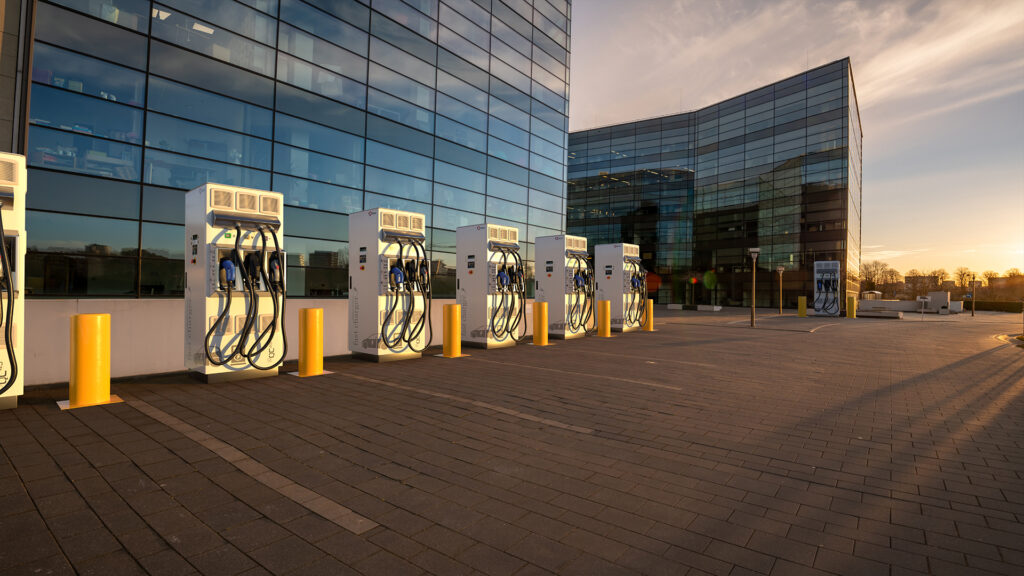
The synergistic union of commercial real estate and the domain of electric vehicle (EV) charging exhibits an inherent and harmonious convergence. Overall, commercial real estate in the United States was valued at $20.7 trillion at the end of 2021. Several authoritative sources say that the EV charging market was $26.5 billion and will grow approximately 25% year over year until the end of the decade. Commercial real estate owners, landlords, investors, and commercial property managers are always looking for ways to increase the value of their properties and income streams. Incorporating an EV charging infrastructure strategy is an evident way to increase property value while providing a public service and employee and tenant benefits. Below are some ways that EV charging stations at your property can benefit commercial real estate investment and value.
Logical Benefits of EV Charging Infrastructure
All types of commercial properties would benefit from an EV charging infrastructure strategy. Simply stated, any property where tenants rent, lease space, and provide services would benefit from having EV chargers installed. Office buildings, medical centers, shopping centers, public parking facilities, industrial buildings, warehouses, sports facilities, etc. Attracting a new set of customers and employees, generating additional revenue, increasing property value and internal rate of return, preparing your property for the future, and promoting ESG and environmental conscientiousness are all benefits of adding an EV infrastructure.
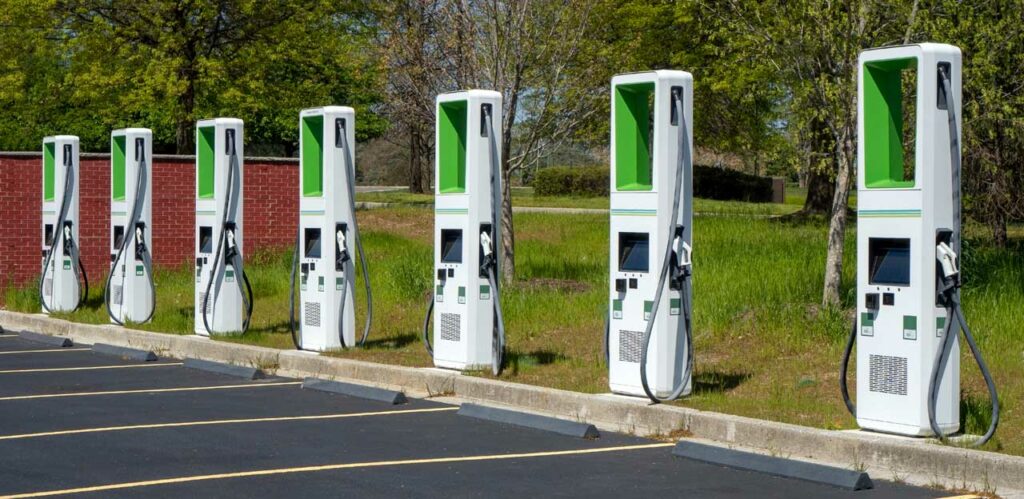
Appealing to New Customers, New Clients, and New Employees
There are several authoritative studies which estimate that there will be 50 million EVs on US roads by 2030 – give or take. Many of those EV drivers will look for buildings, businesses or charging stations where they can “fill up” their vehicles, especially when they will be parked for an extended period. Updated and electric-friendly commercial properties that provide charging stations will surely win EV drivers away from other buildings and businesses that don’t offer charging. It’s a logical and practical reality.
Furthermore, rational, and efficient minded job candidates who own EVs (or are in process of purchasing an EV) are certainly more likely to choose a company/business where they can charge their vehicle throughout the workday. Price Waterhouse Cooper released an important study about EVs which states that by 2030, more than 15% of all charging points/ports in the United States will be at workplaces designed for employees, tenants, and customers. More logical data supporting this trend was released in a US Department of Energy report, more than 78% of workplaces/businesses surveyed said EV charging stations at their facilities helped them hire and retain top talent. More than ever in today’s competitive job market, businesses, commercial property owners, and commercial property managers need to think outside of the box to help recruit and maintain the best employees. Installation of EV chargers for your commercial property’s tenants can also help attract companies/businesses that are looking for this valuable amenity.
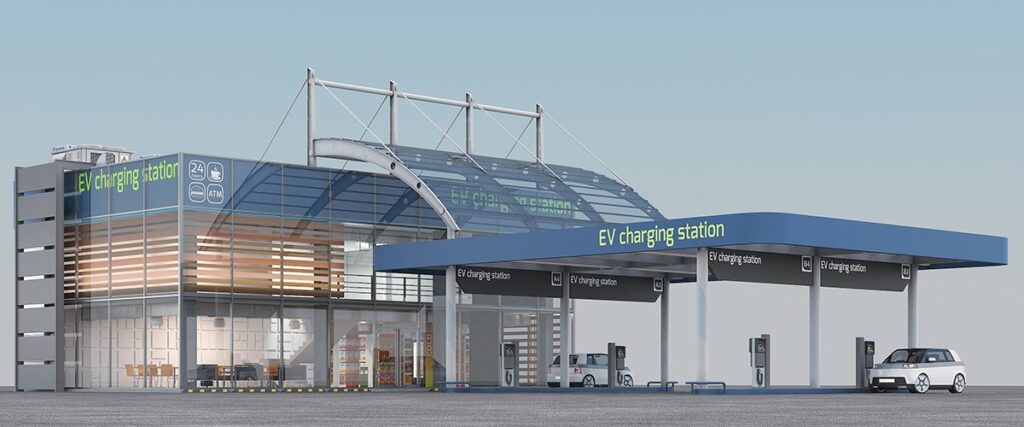
Are You Interested in Additional Revenue Streams?
A strategy employing the integration of EV charging stations within commercial real estate not only contributes to heightened lease retention but also has the added benefit of potential revenue streams for public utilization. Notably, retail, and mixed-use commercial properties stand to gain by enticing drivers and capitalizing on parking spaces. Given the prevailing deficiency of public charging infrastructure across significant expanses of the United States, commercial real estate owners and commercial property managers possess the opportunity to address this deficit by strategically incorporating public charging stations within their parking facilities.
A noteworthy advantage inherent in commercial EV charging stations lies in their capacity to augment revenue streams. Beyond the extended duration EV drivers typically spend engaged in shopping activities during the charging process, commercial property managers can strategically capitalize on parking facilities. While certain commercial establishments provide complimentary charging services, there are several companies who offer an avenue for property owner and property managers to impose fees based on energy consumption or hourly usage, thereby presenting a monetization opportunity for the charging infrastructure.
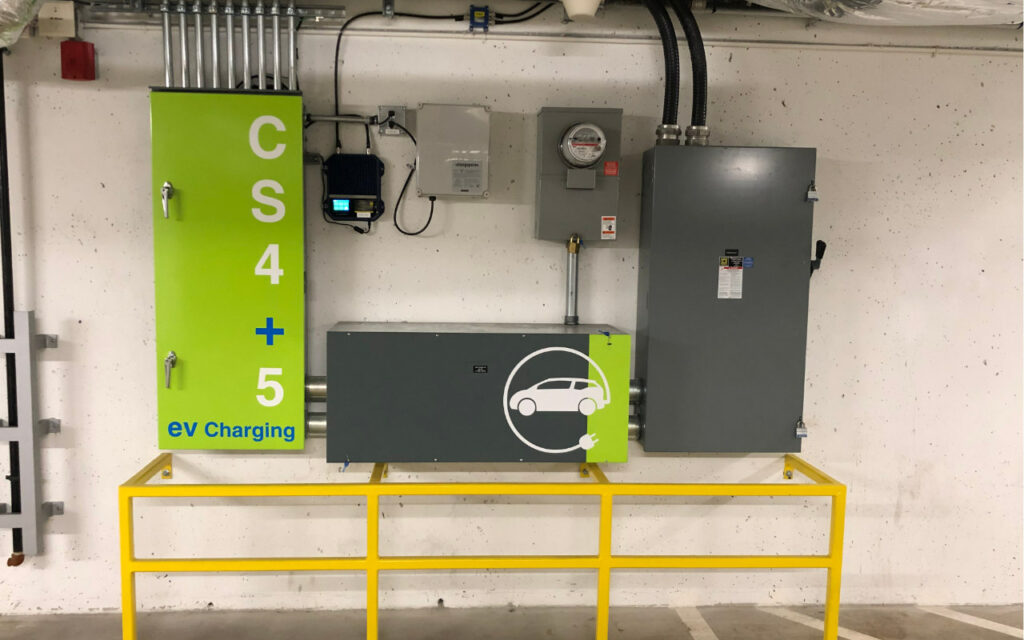
Are You Interested in Increasing Your Building’s Property Value
Improvements to your property like EV charging stations, AI improvements, smart technology infrastructure, LEED certification implementation, among others, can logically improve and increase your properties value. Additionally, this improvement will help you and your property manager increase rents and demand. Importantly, these are also capital improvements for your business which can be depreciated. Companies and business tenants looking for a modern workplace desire commercial properties with EV charging infrastructure – it’s that simple. Potential commercial property buyers will also to be attracted to commercial properties with EV charging infrastructure in place.
How to Fend Off Obsolescence in your Commercial Property?
If your commercial property is tired and obsolete maybe you can get some more mileage out of it by updating it with EV chargers. Everyday more and more EVs are sold, and it is inevitable that one day EVs will be the majority of vehicles and not the exception. Commercial property owners and businesses risk being left “holding the bag” and missing out on the EV revolution. Acting now and installing charging stations will help your commercial property be prepared for the EV wave. We are seeing more and more commercial tenants demand commercial property owners and managers to install EV charging before they renew their leases.
In the future EV chargers may be required in municipal building codes, like the ICC, and certain rebate programs will be available. We can also expect to see certain states and municipalities mandating EV charging infrastructure at new buildings and retrofitting parking lots at existing buildings. Many city government and municipal buildings are ahead of the curve and have already implemented EV charging at their buildings. If you’d like your commercial property and your tenant businesses to stay ahead of the regulations and display corporate sustainability leadership, you should have an EV strategy implemented.
Are You Perceived as an Environmental Leader?
Another added benefit of installing EV charging stations at your commercial property is that it can significantly boost your community involvement, your corporate image, and ESG marketing. Due to increased environmental awareness, tenants, clients, communities, and customers are increasingly seeking out environmentally friendly companies and businesses. Sustainability, energy efficiency, and global warming awareness have all led to an increased global trend towards EVs, and thus, the need for EV charging systems.
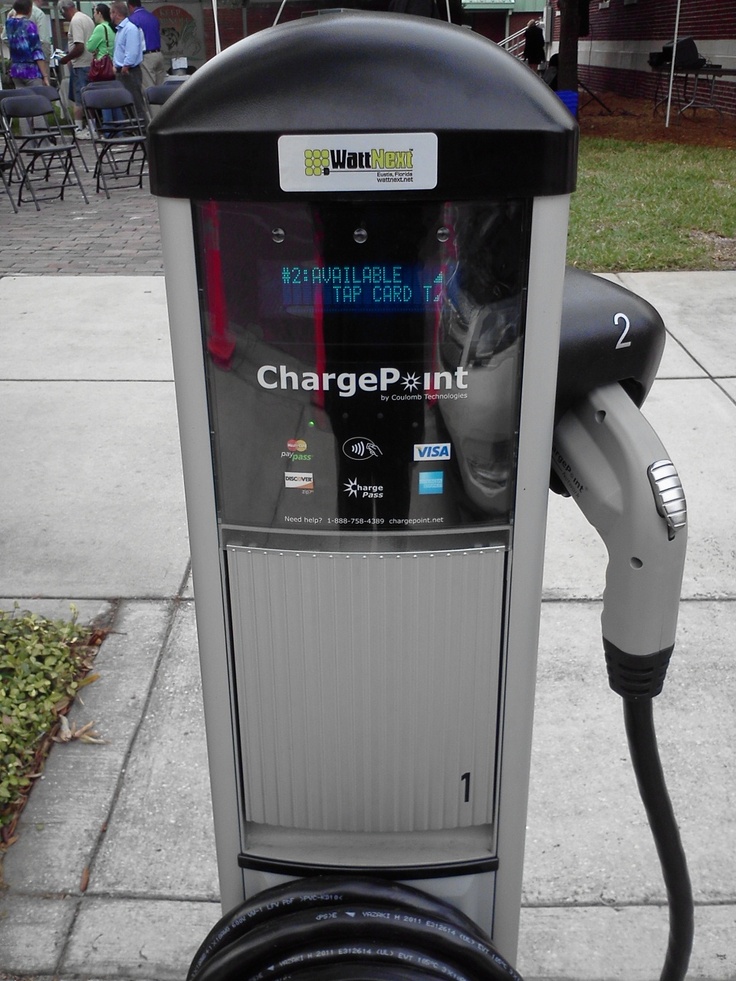
It is estimated that 85% of global consumers consider sustainability important when choosing a brand. Additionally, 60+% of consumers indicate that they’re willing to change their purchasing behavior to help reduce the negative impact on the environment. Logically, consumers want to support companies that are sustainable and energy conscious – this makes EV charging stations and infrastructure an attractive component for your commercial building which consumers will notice.
There are also potential tax breaks and other incentives that EV charging station installations like LEED Leadership in Energy and Environmental Design (LEED). LEED along with a robust ESG strategic plan can help your commercial building be recognized as a big environmental community benefit.
Government Help to Install EV Infrastructure?
There are multiple government incentives (tax breaks, tax credits, rebates) that exist to assist commercial property owners and commercial property managers install EV charging stations on and in their properties, and buildings. The federal government has a program called the Alternative Fuel Refueling Infrastructure Tax Credit, which provides a tax credit of 30% (up to $100,000) for implementation of EV charging stations at qualifying businesses. If your commercial property is within 1 mile of a qualifying highway or freeway the National Electric Vehicle Infrastructure (NEVI) Formula Programs will also help fund installation.
Help Selecting a Charging Station for Your Property?
Every day the EV charging technology gets better and the infrastructure that is being installed around the country, and world for that matter will only improve over time. Today is a great time to start implementing this critical investment for your commercial property to help you raise value, prevent obsolescence, recruit great tenants, talented employees, and customers for your commercial tenants. Who can help design and select which EV chargers are best for your commercial properties? Competent commercial property owners will be able to help, but here are some starting points below when can get you headed in the right direction.
Typically, there are two commercial property options:
- Level 2 chargers
- Direct Current Fast Chargers (DCFCs)
Factors involved in your decision will include:
- Your budget
- Your available power supply (you might need to increase the size of your main electrical panel for a robust charging system)
- The type of businesses that lease your property.
- Do you have solar panels that can supplement energy efficiency?
Help Selecting a Charging Station for Your Property?
Level 2 EV chargers like are also recommended for locations with business fleets of EVs. Level 2 charging stations can usually deliver up to 80amps to charge an EV in a few hours and are ideal for businesses where customers will be spending more time, like a movie theater, mall, hotel, or spa. Your commercial property revenue streams can be improved by charging drivers for using these chargers (while they are shopping at your tenant’s businesses) by the amount of electricity consumed, or you can charge by the amount of time their car in plugged into the charger regardless of the consumption component.
DCFC fast chargers can typically charge a vehicle in under an hour. DCFC is quick, but they require additional electrical infrastructure that is unavailable at the typical workplace. DCFCs are typically found near rest stops, highways, or fleets where business owners do not expect drivers to park for very long. These types of charging systems are more expensive and would properly not be the most cost-effective investment for most commercial property owners.

Costs for Level 2 EV chargers can range from as little as $2,500 to $20,000 depending on the amount of work that is necessitated by the existing building, electrical panels, and access to the port locations. DCFC systems can be 3-7X the cost per charging systems. Every location is different, and costs will vary depending on the property needs and client desires.
As a comparison, the cost for a residential EV charging system can range from $1,000 to $3,000 depending on how far the charging port is located from the main electrical panel. Also, if a new main electrical panel is necessary to provide the power than a $4,000-$6,000 cost for upgrading to 200 ampere panels, and $8,000-$12,000 for 400 ampere panels. Cost estimates were submitted by Robert Bailo of Bay Valley Electric in Mountain View, California. Bailo has installed hundreds of EV chargers in and around Google City.
EV System Solutions for Commercial Properties
A sophisticated system will allow commercial property owners and managers to have a local load management component, which evenly splits the available power supply on a given circuit between all chargers. This type of system allows commercial property owners and managers to add more charging stations without incurring high installation costs.
These systems have dashboards which enable commercial property managers the ability to control their chargers’ settings – like increasing or decreasing prices for different groups or events – from one central dashboard (computer or phone).

Everyday more EVs are on the road and understanding this transition to electric vehicles is a critical first step for commercial property owners and commercial property managers. Commercial properties could easily become the cool new place where EV drivers charge up their vehicles.
Does your Commercial Property Manager Have an EV IQ?
Commercial building owners looking for a professional, dependable, and EV-proficient property management partner, Esquire Property Management Group (ESQPMG) is here. Landlords and commercial property owners are encouraged to ensure their property management professionals are educated and knowledgeable about the latest ESG, environmental and energy-related EV programs. ESQPMG has two real estate attorneys on staff and is daily assuring the properties and tenants they manage are held to higher standards. We will keep our owners educated and on the cutting edge of all technologies – we guarantee it.
David currently is the broker/owner of several real estate related businesses which manage and maintain 300+ client properties on the San Francisco Peninsula.
Trust, transparency, and performance guarantees are the foundation of these businesses. David challenges anyone to find a PM professional that offers services similar - extensive education, customer service, and performance guarantees.
David also provides consulting for his clients on property development feasibility, construction, and complex real estate transactions.
David has authored a published law review article, three real estate books, and over 150+ real estate blog articles.
- “Wildfires, Insurance & Mortgages: Will Your Home Survive the Financial Aftermath?” - March 3, 2025
- What’s Driving California’s Commercial Real Estate Shakeup? - February 27, 2025
- Critical Issues in Triple Net Leases Investors Should Know - February 14, 2025

